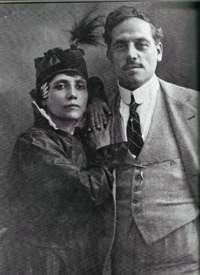Elvira Notari
| Elvira Notari | |
|---|---|
 Elvira and Nicola Notari | |
| Born |
Elvira Coda 10 February 1875 Salerno, Italy |
| Died |
17 December 1946 (aged 71) Cava de' Tirreni, Italy |
Elvira Notari (10 February 1875 in Salerno – 17 December, 1946 in Cava de' Tirreni), Italy's earliest and most prolific female filmmaker, made over sixty feature films and about a hundred documentaries.
Born Elvira Coda, she was of modest social origins. She married Nicola Notari. Together they founded Dora Film. She directed the films, while he worked as a cameraman. Their son 'Gennariello' worked as an actor in many of the films.
The feature films were often based on Neapolitan forms of drama, such as the sceneggiata, and shot on the streets of Naples using non-professional actors. The Notari's realist touch has been linked to the later neorealist movement.
Early life
She was born to Diego Coda and Agnese Vignes.[1] Elvira was allowed to attend school and pursue an education. In school she developed her skills in the use of language and this was shown in her writing. When she finished school she and her family moved to Naples. She worked as a “milliner” which she continued to do even after she became a film maker. Where after some time she found and married Nicola Notari. They had three children, Edoardo, Dora and Maria.
Career
Elvira along with her husband established their production company. After a few name changes they settled on Dora Films. Which was named after her daughter. Her husband worked the camera while Elvira directed and wrote the films. Most of the work done by Dora films was lost, with only a few records remaining. Dora Films was a true production company, which included editing, labs and other necessities to create films. Dora films also had an acting school. At Dora films Elvira produced documentaries and short films. According to a testimony by her son, Elvira was one to demand a real and true performance from her actors. The films produced at Dora films had were done through a female gaze as well as dealing with life in Italy. Elvira would remind her actors about sad moments in her life. This was “reminiscent of neorealism”.[2] Elvira is credited with contributing to the director, director of the acting school as well as being a scriptwriter. It is understood that she might have also worked on the editing of the films they produced. Elvira Notari relied on women's literature when it came to the development of her ideas. In her “female melodramas” she focuses on the female perspective. Elvira had a tendency of portraying the "dark woman", the femme fatale, a woman who deviated from the norm. There was a focus on the female body as well as female fantasy, which is an aspect of Elvira Natori's work. In her works 'Nfama! and A Piedigrotta the female leads are described as the "unruly female figure"[6] the films go on to portray the struggle of these women. One of the other themes in her films, that present these types of women, is desire. Men desiring women, women desiring some sort of feeling or emotion.
Censorship in Italy had come down on Dora films. The films shined a light on aspects of Italian life that many found unsuitable to be portrayed. The films often dealt with “crude language and sexual undertones” .[3] which tested the idea of censorship. Censorship often asked for scenes to be edited or removed.
Later life: At the end of Dora films in 1930, Elvira and her husband moved on. Due to the incoming of sound in films and the rise of censorship Dora films ended. Elvira moved back to Salerno where she retired. The Notari’s started a photography equipment store .[4] Later on her husband became a film distributor .[5]
Filmography
| Year | Title | Contribution | Notes | |
|---|---|---|---|---|
| 1917 | 'E Scugnizze | Director | ||
| 1920 | A Piedigotta | Director | short | |
| 1922 | 'A Santanotte | Director | ||
| 1922 | E'Piccerella | Director | Short | |
| 1924 | 'Nfama | Director | ||
| 1927 | Soldier's Fantasy | Director | ||
| 1928 | Napoli Terra d' Amore | Director | ||
| 1928 | Duie Paravise | Director | ||
Notes
References
- Giuliana Bruno, Streetwalking on a Ruined Map: Cultural Theory and the City Films of Elvira Notari, Princeton University Press, 1993
- Gwendolyn Audrey Foster, Women film directors: an international bio-critical dictionary, Greenwood Publishing Group, 1995 ISBN 0-313-28972-7
- Bruno, Giuliana (1993). Streetwalking On A Ruined Map. Princeton University Press. p. 416. ISBN 0-691-02533-9.
- "Elvira Notari". IMDB. Retrieved 6 May 2012.
- Tomadjogiou, Kimberly (1922). "I film-sceneggiata". Bianco e Nero. LXXII (570).
- Bruno, Giuliana (Feb 1993). "Notari und Neopolitanische Film: ein historisches panorama". Freun und film (56–57).
External links
- Elvira Notari at the Internet Movie Database
- Elvira Notari at the Women Film Pioneers Project